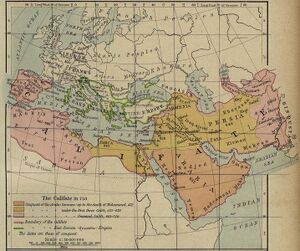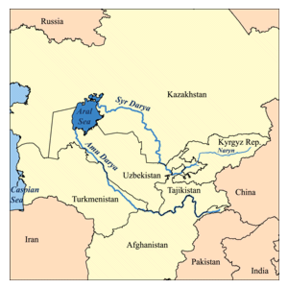Khwarezm
| Author:Laxman Burdak, IFS (R) |



Khwarezm or Khwarizm (Persian: خوارزم) is a large oasis region on the Amu Darya river delta in western Central Asia. Today Khwarezm belongs partly to Uzbekistan, partly to Kazakhstan and partly to Turkmenistan.
Location
It is bordered on the north by the (former) Aral Sea, "Daryocha-i Khorazm" (Lake Khwarazm) on the east by the Kyzylkum desert, on the south by the Karakum desert, and on the west by the Ustyurt Plateau.
Variants of name
- Chorasmians (Anabasis by Arrian, p. 234, 273, 387.)
- Chorasmia
- Chorasmii (Pliny.vi.18)
- Chorasmians (Arrian:5.15)
- Chorezm
- Harezm
- Horezm
- Huwarazmish (Old Persian)
- Huvarazmish (Achaemenid inscriptions)
- Khwarezm
- Khwarezmia,
- Khwarizm,
- Khwarazm,
- Khorezm,
- Khoresm,
- Khorasam,
- Khwārazm (Modern Persian)
- Xvairizem (Avestan)
- Khwārizm (Arabic خوارزم )
- qʰaljɯʔmriɡ(呼似密) Old Chinese
- Huālázǐmó (modern Chinese 花剌子模))
- Хорезм (Kazakh )
- Xorazm (Uzbek)
- Horezm (Turkmen)
- Harezm (Turkish)
- Χορασμία and Χορασίμα Greek by Herodotus
Jat Gotras Namesake
- Choradia = Chorasmii (Pliny.vi.18)
- Khuwar = Khwarezm = Chorasmii (Pliny.vi.18)
- Khoreja = Khorezm = Chorasmii (Pliny.vi.18)
Jat Gotras Namesake
- Choradia = Chorasmians (Anabasis by Arrian, p. 234, 273, 387.)
- Khuwar = Khwarezm = Chorasmians (Anabasis by Arrian, p. 234, 273, 387.)
- Khoreja = Khorezm = Chorasmians (Anabasis by Arrian, p. 234, 273, 387.)
Mention by Pliny
Pliny[1] mentions Nations situated around the Hyrcanian Sea.... Beyond the nations already mentioned, are the Chorasmii,13 the Candari,14 the Attasini, the Paricani, the Sarangæ, the Marotiani, the Aorsi,15 the Gaëli, by the Greek writers called Cadusii,16 the Matiani, the city of Heraclea,17 which was founded by Alexander, but was afterwards destroyed, and rebuilt by Antiochus, and by him called Achaïs; the Derbices also,18 through the middle of whose territory the river Oxus19 runs, after rising in Lake Oxus,20
13 An extensive tribe of 'Sogdiana, now represented by the district of Khawarezm, in the desert country of Khiva.
14 A tribe in the north-western part of Sogdiana. They appear to have been situate to the east of the district of Khawarezm. It has been suggested that they derived their name from the Sanscrit Gandharas, a tribe beyond the Indus.
15 The chief seat of the Aorsi, who appear to have been a numerous and powerful people both of Europe and Asia, was in the country between the Tanais, the Euxine, the Caspian, and the Caucasus. It seems doubtful, however, whether it is these people who are alluded to in the present passage.
16 These would almost seem to be a different people from those mentioned in c. 15 of the present Book, as dwelling in Atropatene. The present appears to have been a tribe of Sogdiana.
17 Strabo mentions a town of this name, which he places, together with Apamea, in the direction of Rhagæ. If Pliny has observed anything like order in his recital of nations and places, the Heraclea here mentioned cannot be that spoken of by Strabo, but must have been distant nearly 1000 miles from it.
18 This was a tribe, apparently of Scythian origin, settled in Margiana, on the left bank of the Oxus. Strabo says that they worshipped the earth, and forbore to sacrifice or slay any female; but that they put to death their fellow-creatures as soon as they had passed their seventieth year, it being the privilege of the next of kin to eat the flesh of the deceased person. The aged women, however, they used to strangle, and then consign them to the earth.
19 The modern Jihoun or Amou. It now flows into the Sea of Aral, but the ancients universally speak of it as running into the Caspian; and there are still existing distinct traces of a channel extending in a southwesterly direction from the sea of Aral to the Caspian, by which at least a portion, and probably the whole of the waters of the Oxus found their way. into the Caspian; and not improbably the Sea of Aral itself was connected with the Caspian by this channel.
20 Most probably under this name he means the Sea of Aral.
Names and etymology
Khwarezm has been known also as Chorasmia, Khwarezmia, Khwarizm, Khwarazm, Khorezm, Khoresm, Khorasam, Harezm, Horezm, and Chorezm.[2]
In Avestan the name is Xvairizem, in Old Persian Huwarazmish, in Modern Persian خوارزم (Khwārazm), in Arabic خوارزم Khwārizm, in Old Chinese *qʰaljɯʔmriɡ(呼似密), modern Chinese Huālázǐmó (花剌子模), in Kazakh Хорезм, in Uzbek Xorazm, in Turkmen Horezm, in Turkish Harezm, in Greek Χορασμία and Χορασίμα, by Herodotus.
The Arab geographer Yaqut al-Hamawi in his Muʿǧam al-buldan wrote that the name was a compound (in Persian) of khwar (خوار), and razm (رزم), referring to the abundance of cooked fish as a main diet of the peoples of this area.[3]
C.E. Bosworth however, believes the Persian name to be made up of (خور) meaning "the sun" and (زم) meaning "Earth", designating "the land from which the sun rises",[4] although the same etymology is also given for Khurasan. Another view is that the Iranian compound stands for "lowland" from kh(w)ar "low" and zam "earth, land.".[5] Khwarezm is indeed the lowest region in Central Asia (except for the Caspian Sea to the far west), located on the delta of the Amu Darya on the southern shores of the Aral Sea. Various forms of khwar/khar/khor/hor are commonly used also in the Persian Gulf to stand for tidal flats, marshland, or tidal bays (e.g., Khor Musa, Khor Abdallah, Hor al-Azim, Hor al-Himar, etc.)
The name also appears in Achaemenid inscriptions as Huvarazmish, which is declared to be part of the Persian Empire.
Some of the early scholars believed Khwarezm to be what ancient Avestic texts refer to as Airyanem Vaejah ("Ariyaneh Waeje"; later Middle Persian Iran vij).[6] These sources claim that Old Urgench, which was the capital of ancient Khwarezm for many years, was actually Ourva, the eighth land of Ahura Mazda mentioned in the Pahlavi text of Vendidad.[7] However, Michael Witzel, a researcher in early Indo-European history, believes that Airyanem Vaejah was located in what is now Afghanistan, the northern areas of which were a part of ancient Khwarezm and Greater Khorasan.[8] Others, however, disagree. University of Hawaii historian Elton L. Daniel believes Khwarezm to be the "most likely locale" corresponding to the original home of the Avestan people, and Dehkhoda calls Khwarezm "مهد قوم آریا" ("the cradle of the Aryan tribe").[9]
History
It was the center of the (indigenous) Khwarezmian civilization and a series of kingdoms such as the Persian empire, whose capitals were (among others) Kath, Gurganj (the modern Köneürgenç) and, from the 16th century on, Khiva.
Ch 5.15: Alliance with the Scythians and Chorasmians
Arrian[10] writes....Another embassy from the European Scythians came to Alexander with the envoys whom he had despatched to those people; for the king who was reigning over them at the time when he sent these envoys, happened to die, and his brother was reigning in his stead. The object of the embassy was to state that the Scythians were willing to do whatsoever Alexander commanded. They were also bringing to him from their king the gifts which among them are deemed most valuable. They said their monarch was willing to give his daughter to Alexander in marriage, in order to confirm the friendship and alliance with him; but if Alexander himself deigned not to marry the princess of the Scythians, then he was willing at any rate to give the daughters of the viceroys of the Scythian territory and of the other mighty men throughout the country of Scythia to the most faithful of Alexander's officers. He also sent word that he would come in person if bidden, in order to hear from Alexander's own mouth what his orders were. At this time also came Pharasmanes, king of the Chorasmians,[1] to Alexander with 1,500 horsemen, who affirmed that he dwelt on the confines of the nations of the Colchians and the women called Amazons,[2] and promised, if Alexander was willing to march against these nations in order to subjugate the races in this district whose territories extended to the Euxine Sea, to act as his guide through the mountains and to supply his army with provisions. Alexander then gave a courteous reply to the men who had come from the Scythians, and one that was adapted to the exigencies of that particular time; but said that he had no need of a Scythian wedding. He also commended Pharasmanes and concluded a friendship and alliance with him, saying that at present it was not convenient for him to march towards the Euxine Sea. After introducing Pharasmanes as a friend to Artabazus the Persian, to whom he had intrusted the government of the Bactrians,[3] and to all the other viceroys who were his neighbours, he sent him back to his own abode. He said that his mind at that time was engrossed by the desire of conquering the Indians; for when he had subdued them, he should possess the whole of Asia. He added that when Asia was in his power he would return to Greece, and thence make an expedition with all his naval and military forces to the eastern extremity of the Euxine Sea through the Hellespont and Propontis.[4] He desired Pharasmanes to reserve the fulfilment of his present promises until then. Alexander then returned to the river Oxus, with the intention of advancing into Sogdiana, because news was brought that many of the Sogdianians had fled for refuge into their strongholds and refused to submit to the viceroy whom he had placed over them. While he was encamping near the river Oxus, a spring of water and near it another of oil rose from the ground, not far from Alexander's own tent. When this prodigy was announced to Ptolemy, son of Lagus, the confidential body-guard, he told Alexander, who offered the sacrifices which the prophets directed on account of the phenomenon. Aristander affirmed that the spring of oil was the sign of labours; but it also signified that after the labours there would be victory.
1. The Chorasmians were a people who inhabited the country near the lower part of the river Oxus, between the Caspian and Aral seas.
2. This mythical race of warlike females is said to have come from the Caucasus and to have settled near the modern Trebizond, their original abode being in Colchis. Cf. Arrian (vii. 13); Strabo(xi. 5); Diod. (xvii. 77); Curt. (vi. 19); Justin (xii· 3); Homer; (Iliad, iii. 189); Aeschylus (Eumenides, 655); Herod (iv. 110-116; ix. 27).
3. See iii. 29 supra.
4. Propontis means the sea before the Pontus. Compare Ovid (Tristia, i. 10, 31):— "Quaque tenent Ponti Byzantia littora fauces."
External links
References
- ↑ Natural History by Pliny Book VI/Chapter 18
- ↑ Encyclopedia Iranica, CHORASMIA region on the lower reaches of the Oxus (Amu Darya) in western Central Asia.
- ↑ Yaqut al-Hamawi, Mu'jem al-baladan, Vol2, p395
- ↑ C. E. Bosworth, The Encyclopedia of Islam, Vol IV, 1978. p. 1061
- ↑ Encyclopedia Iranica, CHORASMIA region on the lower reaches of the Oxus (Amu Darya) in western Central Asia.
- ↑ Bahram Farahvoshi. Iranovich, Tehran University Press. 1991. p. 8
- ↑ Musa Javan. Tarikh-i Ijtima'i Iran-i Bastan (The social history of ancient Iran), 1961. p. 24
- ↑ Michael Witzel. "The Home of the Aryans."
- ↑ Elton L. Daniel, The History of Iran. 2001. ISBN 0-313-30731-8. p.28
- ↑ The Anabasis of Alexander/4b, Ch.15

